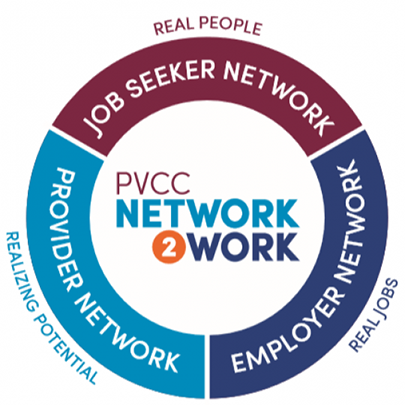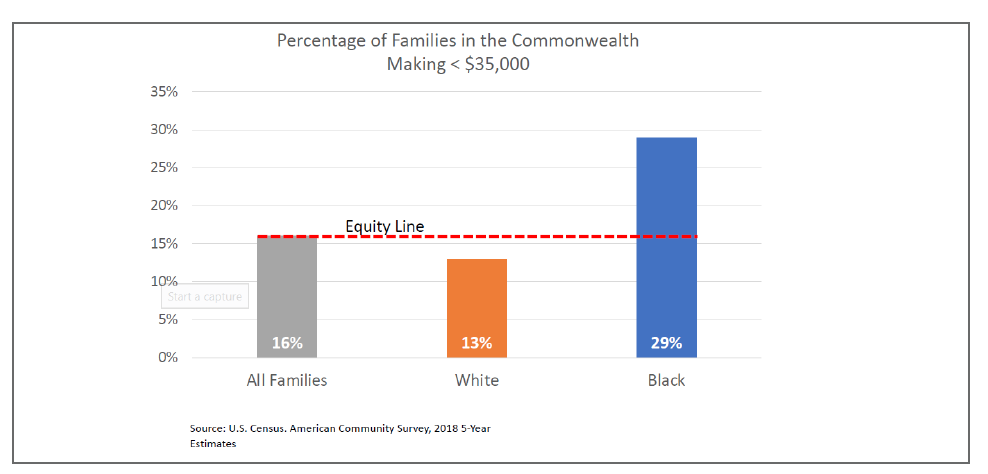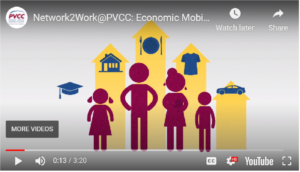Economic Renewal: Building a Healthy Economy through Network2Work

by Ridge Schuyler
Network2Work brings together the three key networks that are essential for creating pathways to jobs and careers that pay family-sustaining wages—Employer, Jobseeker, and Provider.”
Too many families in the Commonwealth do not earn enough money to pay for the essentials of life—food, shelter, clothing, utilities—and the costs associated with working, primarily childcare and transportation. The novel coronavirus highlights conditions that are, sadly, not novel at all—low-income individuals, especially individuals of color, are suffering disproportionately, both physically and financially. These health and income inequities—which were pre-existing conditions before COVID-19—will persist long after the pandemic subsides unless we are as intentional in solving poverty as we were in creating it. We should focus our recovery efforts not on restoring the old economy but on rebuilding an equitable economy, intentionally constructed on a foundation of racial justice. At Piedmont Virginia Community College (PVCC), we’ve built a framework that we believe can serve as such a foundation—Network2Work.

Network2Work (N2W) is built on a simple premise—a community thrives when its residents thrive. Residents thrive when their capacity as human beings is unleashed. And their capacity as human beings can only be unleashed when their basic needs are met. The N2W framework was designed intentionally to match job-seekers to family-sustaining jobs and connect them to community resources using neighborhood based volunteers.
There is one group—and only one group— which has the interest and capacity to give people money, even more than they “need,” month after month, year after year— employers. Yet, those who most need to connect to those employers often have the least access. Network2Work addresses this fundamental challenge. Network2Work uses a political style ground game of well-connected individuals in low-income neighborhoods to recruit job-seekers. With this framework as a foundation, rebuilding a healthy economy will begin in communities with neighbors helping neighbors.
Network2Work Framework—How it Works
Network2Work brings together the three key networks that are essential for creating pathways to jobs and careers that pay family- sustaining wages: employers, social- and job-training service organizations, and a creative system of job seeker recruitment.
- Employer Network: Network2Work leverages relationships with employers with jobs that pay $30,000 or more, that lead to a career, and that do not require a college degree. The focus is on those with career ladders, such as those that offer apprenticeships. Most of the entry-level positions require credentials that are eligible for funding through the Commonwealth’s FastForward program. The focus is on jobs that lead to careers in six main pathways: manufacturing, healthcare, information technology, childcare, public safety, and those that offer apprenticeships.
- Provider Network: Network2Work partners with resource providers who can address the barriers in the following realms that typically prevent low- and no-wage individuals from securing quality employment.
- Core skills education
- Technical skills training
- Childcare
- Transportation
- Housing
- Physical health
- Mental health
- Food security
- Work supplies/materials/clothing
- Legal assistance
- Financial buffer
Through our provider network, we strive to serve the whole person because it is the whole person who shows up for work. A thriving client is not just someone who is well-trained, but also someone who has reliable transportation, affordable childcare, stable shelter, and adequate, healthy food.
- Job-Seeker Network: Network2Work leverages community Connectors to identify job-seekers who would be a good match for the job. This is the “secret sauce” of the N2W framework. These neighborhood- based connectors—those people in the community who know everybody and who others turn to for information and advice—lie at the heart of the N2W approach. These are the people who are at the center of social networks that exist all around us—in our neighborhoods, our schools, our churches, our nonprofits, our immigrant communities. They are the glue that holds communities together. These Connectors identify low- and no-income individuals who would be a good fit for a quality job available in the community.
This N2W component directly confronts a fundamental challenge—that many of those who have been left behind in our economy distrust and/or are disconnected from the very institutions established to serve them. Information spreads more extensively and more credibly through people’s social networks with individuals they know and trust. This can be their friends and neighbors, but it can also be agencies and nonprofits to whom struggling individuals have turned for help.
Alignment through technology: The three networks that make up Network2Work— Employer, Job-seeker, and Provider—are created and sustained by human relationships, but those relationships can be coordinated and amplified through the N2W technology platform. The platform comprehensively engages with all who are involved. First, it allows employers to post job opportunities in language easily understood by community Connectors. It then enables Connectors to match their friends and neighbors to available jobs using their smartphones. It allows job-seekers to be matched to the specific providers who can best meet their needs as they travel the pathway to family-sustaining jobs and careers. And finally, it provides a closed-loop referral system that alerts both the job-seeker and their Navigator when progress along the pathway has stalled so action can be taken.
We at PVCC are working with other communities in the Commonwealth seeking to adopt the N2W framework, and together we hope to serve more families striving to thrive. If your community may be interested in adopting this framework, please contact Ridge Schuyler. to find out how you mi get started.
Links:


Ridge Schuyler has served as Dean of the Community Self-Sufficiency Programs division at Piedmont Community College since 2016 where he directs Network2Work@PVCC. Ridge graduated from the University of Michigan and the University of Virginia School of Law. He spent 10 years on Capitol Hill serving as Chief of Staff to U.S. Congressman Rick Boucher (VA-9) and Chief Policy Advisor to U.S. Senator Charles S. Robb of Virginia.
